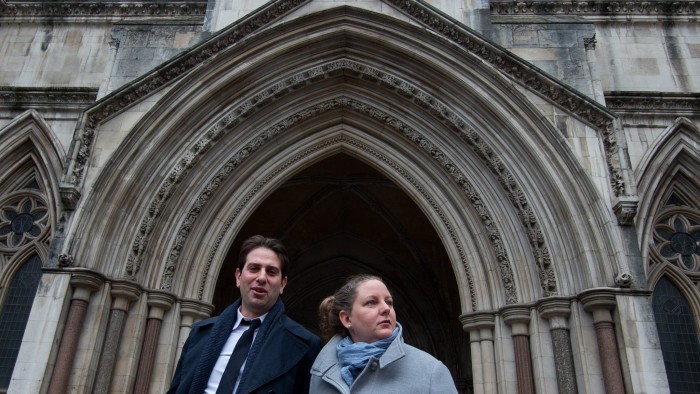I’m heterosexual and would like to enter into a civil partnership

Roula Khalaf, Editor of the FT, selects her favourite stories in this weekly newsletter.
I see that the Supreme Court has ruled that heterosexual couples can now enter into civil partnerships. This is something my partner and I have always wanted to do. Does this mean that we can now do this? Or is it going to be a long process waiting for this to come into effect?
Joanna Pratt, partner at law firm Thomson Snell & Passmore, says the Civil Partnership Act 2004, which came into force in 2005, enabled same-sex couples to obtain formal recognition of their relationships.
It was viewed as a significant step forward for same-sex couples who, before the Civil Partnership Act, had no means of seeking legal recognition of their relationship. The rights and obligations of couples who are in civil partnerships mirror those of married couples.
Pressure has been growing in parliament to allow same-sex “marriages”, resulting in the law being changed in July 2013, with the first same-sex marriages taking place on March 29 2014.

Rebecca Steinfeld and Charles Keidan, a heterosexual couple, want legal recognition of their relationship, but do not want to be “married”. Instead they have been campaigning, and sought legal redress, to enable them to enter into a civil partnership. Currently, same-sex couples have the choice of entering into a civil partnership or to be married, whereas heterosexual couples only have the option of being married.
The Supreme Court delivered its long-awaited decision in respect of their case last month. It declared that the fact that only same-sex couples can enter into a civil partnership is incompatible with human rights legislation and amounts to discrimination. The decision does not however change the law. For that to happen with regard to the law on civil partnerships, parliament must enact new legislation.
Joanne Raisbeck, legal director at law firm Hill Dickinson, said the couple were victorious in June. However, while this was a victory on paper, the decision will remain toothless unless the government takes action to remedy the discrimination by way of statutory change.
While the Supreme Court has unequivocally and unanimously ruled that the Civil Partnership Act is incompatible with the European Convention on Human Rights, because it prohibits heterosexual couples from entering into a civil partnership, this decision does not change the law. This means that it is still not possible for heterosexual couples to enter into a civil partnership.
Civil partnership was introduced into English law by The Civil Partnership Act 2004. This legislation enabled same sex couples to obtain legal recognition of their relationship by registering as civil partners to each other. Ten years later the Marriage (Same Sex Couples) Act enabled same-sex couples to enter into a marriage. However, this legislation does not permit a heterosexual couple to opt for civil partnership over marriage as it only applies to same-sex couples.

As the law stands, this is a paper victory for the heterosexual couple who mounted a legal challenge and won. It will remain toothless unless the government takes action to remedy the discrimination by way of statutory change.
In the Supreme Court written ruling, Lord Kerr said it was “salutary to recall that a declaration of incompatibility does not oblige the government or parliament to anything.” In other words, the court cannot usurp the role of parliament.
Therefore, while the ruling marks a significant step forward towards the possibility of heterosexual couples being able to enter into a civil partnership in the future, for the time being discrimination continues.
One would expect the ruling to put pressure on the government to react but so far it has shown indifference. It is telling that throughout the case the government did not seek to justify the difference in treatment between same-sex and different-sex couples and indeed accepted that the difference could not be justified. It sought “tolerance of the discrimination while it sorts out how to deal with it”.
So what will happen now? Campaigners will continue to lobby for legislative change. A letter has already arrived at the door of Penny Mordaunt, Conservative MP and minister for women and equalities, urging her to “seize the opportunity to turn defeat into victory” by declaring an immediate intention to legislate to extend civil partnerships to all. A private members bill by Tim Loughton MP, which if carried would allow all couples to opt for civil partnership, is also still being considered.
Pressure on the government to comply with the Supreme Court ruling will certainly grow but the timing of any action it may take remains unknown. Even when change is implemented this may not give the green light for heterosexual couples to become civil partners, as the government might decide that the easier route is to simply abolish such rights altogether rather than extend them.
The opinions in this column are intended for general information purposes only and should not be used as a substitute for professional advice. The Financial Times Ltd and the authors are not responsible for any direct or indirect result arising from any reliance placed on replies, including any loss, and exclude liability to the full extent.
Do you have a financial dilemma that you’d like FT Money’s team of professional experts to look into? Email your problem in confidence to money@ft.com
Our next question
My wife and I are separated but not divorced. We both own our own properties in our own name. Do we both qualify for the additional property relief? We both have stated in our wills that the property we own will be left to our children.
Comments